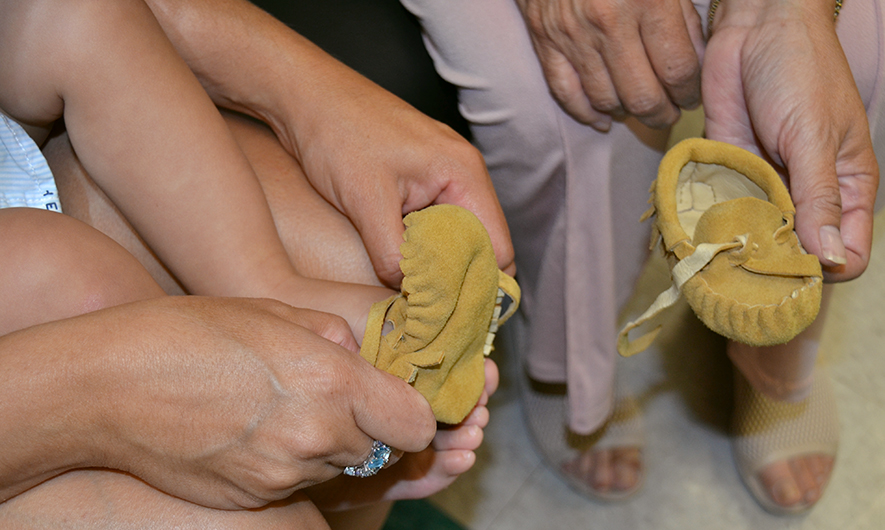Giinwi (before colonization) Gaashi (what we used to do) Maamwiziying (together) Ndaadzikeying* (to assist in giving life)

March 4, 2020
Improving access to Indigenous midwifery
The Association of Ontario Midwives will convene a gathering of Indigenous communities on March 6-7, 2020 to envision concrete pathways to improve access to Indigenous midwifery. This two-day gathering brings together over 50 communities and education experts.
The demand for midwifery services currently for outpaces the number of midwives. This gathering will seek to envision a path forward to educate a new cadre of Indigenous midwives to meet that need.
Of the 133 Indigenous communities in Ontario, only about 12 have access to Indigenous midwifery services. For most Indigenous communities in the north, accessing care during pregnancy and birth often means travelling long distances out of community to access care.
“One of the legacies of colonialism and residential schools has been the loss of midwifery and birth from our communities. Indigenous midwives hold the promise of returning birth to our communities. The loss of the ceremony that is birth cannot be underestimated. Reclaiming birth in our communities is the essential foundation to restore lifelong health,” says Ellen Blais, Director of Indigenous Midwifery at the Association of Ontario Midwives.
The need to concrete pathways to educate more Indigenous midwives was a key action that was articulated at a historic gathering of Indigenous midwives and communities that took place one year ago. The 2019 gathering, called Bring Birth Home! Voices from the Indigenous Midwifery Summit: A Reclamation of Community Birth through a Northern Indigenous Vision was held on Fort William First Nation, Robinson Superior Treaty.
It included representation from political-territorial organizations, Nishnawbe Aski Nation, Grand Council Treaty #3, as well as the regional coordination body, Chiefs of Ontario. Sioux Lookout First Nations Health Authority also contributed.
In total, representation from 48 First Nations located within the borders of Ontario participated. A report following the 2019 gathering included five recommendations, including the need to educate a greater number of Indigenous midwives and to develop education opportunities that would support northern Indigenous people to access education close to home.
The March 2020 gathering will revolve around structured discussion, with the goal of charting a path forward for educating more Indigenous midwives. Specifically, participants will discuss the impact of routine evacuation from community for birth; community infrastructure and readiness (including the current state of health facilities); community integration of midwifery; child welfare intervention with a specific goal of decreasing apprehensions; and the support Indigenous people interested in pursuing midwifery work need to both access and succeed in midwifery education.
The AOM is grateful for the contributions and wisdom of the organizing committee for this gathering. Without this collaborative effort, our shared vision and hopes of Indigenous midwifery in every Indigenous community would not be possible. Sincere gratitude to the organizing committee members, including:
- Alyssa Gagnon, student midwife, Ryerson MEP; Taykwa Tagamou First Nation
- Ashlee Tom, Ontario Native Women’s Association (replacing Darci Everson)
- Bernadette deGonzague, Chiefs of Ontario
- Carol Couchie, National Aboriginal Council of Midwives
- Cecilia Spence, Nishnawbe Aski Nation Women’s Council
- Christine Roy, RM, Neepeeshowan Midwives
- Cindy Hunt, Sioux Lookout First Nations Health Authority
- Cliff Davis, First Nations & Inuit Health Branch, Ontario region; Indigenous Services Canada (replacing Tracy Cameron)
- Debbie Lipscombe, Grand Council Treaty 3
- Julie Wilson, RM, Six Nations Maternal & Child Centre
- Lisa Bishop, RM, Dilico Anishnabek Family Care
- Paula Vangel, Nishnawbe Aski Nation (Health Transformation)
- Serena Joseph, Waasegiizhig Nanaandawe’iyewigamig Health Access Centre
- Wendy Trylinski, Nishnawbe Aski Nation
- Ellen Blais, Marla Monague and Tamara Cascagnette, Association of Ontario Midwives
For more information, contact:
Marla Monague
Policy Analyst, Indigenous Midwifery
*Anishinaabemowin, the language of the Anishinaabek Nation.
